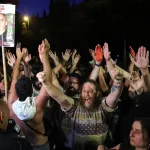Pre-trial hearings began Thursday at the Tokyo District Court’s 17th Criminal Court Division, kicking off a new phase in a saga that began in November when Ghosn was arrested just after landing at Haneda Airport on a private jet. Ghosn, wearing a grey suit, didn’t say anything before entering courthouse just before proceedings began at 10 a.m. in Tokyo.
His detention on allegations ranging from falsifying financial records to redirecting company money into his own accounts shocked the global auto industry. The alliance Ghosn created between Nissan Motor Co., Renault SA and Mitsubishi Motors Corp. was shaken to its core.
In the half year since, the three-way partnership has moved on. New executives were brought in to restore profitability and navigate through an industry that’s facing disruption from electrification, self-driving vehicles and new business models for transporting people and goods.
Ghosn, 65, is charting a different path, his energy focused on fighting for his freedom, proving his innocence and restoring his reputation. While Ghosn may be tempted to bring the same intensity and energy that he brought as ” Le Cost Killer” to Nissan, it’s more likely that the pre-trial hearings and trial will be a drawn-out process with little drama.
“The format of argumentation is primarily on paper, not live,” said Stephen Givens, a professor of law at Sophia University in Tokyo. “In the U.S., one of the skills that litigators need to have is to be able to think quickly on their feet. There’s very very little of that in Japan.”
Ghosn is facing a total of four charges:
Financial misconduct related to under-reporting of compensation and income during the fiscal years of 2010 to 2014. Financial misconduct related to under-reporting of compensation and income during the fiscal years of 2015 to 2017. Aggravated breach of trust for transactions that allegedly transferred 1.85 billion yen ($16.7 million) of Ghosn’s own personal investment losses to Nissan, and for transactions in Saudi Arabia totaling $14.7 million that were made from a Nissan unit to another account between June 2009 and March 2012, which allegedly inflicted damage on Nissan. Aggravated breach of trust related to transactions made in Oman, for allegedly moving $5 million from Nissan to a dealership and then into a company he controlled in Lebanon, with the money flowing into companies headed by Ghosn’s wife and son.
Due Process
Prosecutors arrested Ghosn multiple times as they handed down the indictments. He was briefly freed on bail, arrested, and then released again, spending a total of 130 days in jail. The former auto executive has consistently denied the charges, describing them as “biased, taken out of context, twisted in a way to paint a personage of greed and a personage of dictatorship.”
“I hope to be given a fair trial where the truth will come to light and I will be fully vindicated,” Ghosn said in a statement issued after his second release on bail on April 25.
Ghosn is planning to attend Thursday’s pre-trial hearing, according to his lawyer, Junichiro Hironaka. Nissan, which has also been charged on one count for allegedly understating Ghosn’s income, declined to comment on the judicial process.
“The company’s focus is on stabilizing operations and strengthening its management structure, while addressing the weaknesses in governance that enabled this misconduct,” said Nicholas Maxfield, a Nissan spokesman.
Read more about Nissan’s struggles to restore profitability.
Legal Strategy
Thursday’s hearing will focus on the two breach of trust charges, the Sankei newspaper reported, citing Hironaka. A hearing for the two charges for financial misconduct will be held June 24, the newspaper said.
The trial probably won’t get underway until 2020, according to Hironaka. Between now and then, there will be several pre-trial hearings like the one on Thursday, mostly likely three or four for each set of indictments. The purpose of the pre-trial hearings, a new procedure enacted in 2005, is to narrow the scope of charges in order to streamline legal proceedings and speed up the trial.
“The pretrial hearing is so important that it can almost decide the outcome, because you have to decide whose testimony the court is going to hear and which piece of evidence the court will examine,” said Hiroki Sasakura, a professor specializing in criminal procedure at Keio University Law School in Tokyo. DM





















 Become an Insider
Become an Insider